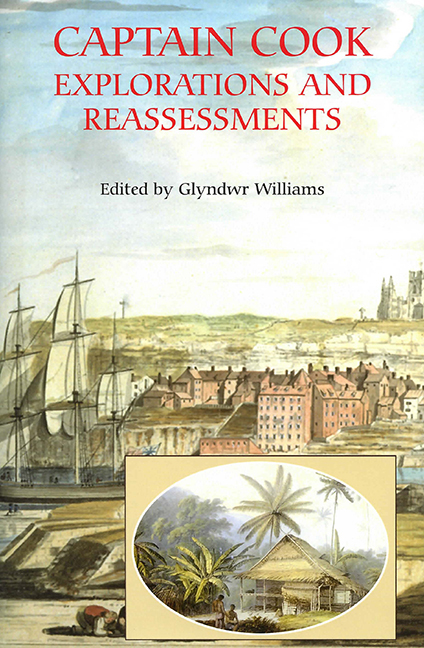Book contents
- Frontmatter
- Contents
- List of illustrations
- Contributors
- Acknowledgements
- Abbreviations
- Introduction
- Part I The Years in England
- Part II The Pacific Voyages
- Part III Captain Cook and his Contemporaries
- Part IV The Legacy of Captain Cook
- 11 Redeeming memory: the martyrdoms of Captain James Cook and Reverend John Williams
- 12 ‘As befits our age, there are no more heroes’: reassessing Captain Cook
- 13 Retracing the Captain: ‘Extreme History’, hard tack and scurvy
- Index
12 - ‘As befits our age, there are no more heroes’: reassessing Captain Cook
from Part IV - The Legacy of Captain Cook
Published online by Cambridge University Press: 25 October 2017
- Frontmatter
- Contents
- List of illustrations
- Contributors
- Acknowledgements
- Abbreviations
- Introduction
- Part I The Years in England
- Part II The Pacific Voyages
- Part III Captain Cook and his Contemporaries
- Part IV The Legacy of Captain Cook
- 11 Redeeming memory: the martyrdoms of Captain James Cook and Reverend John Williams
- 12 ‘As befits our age, there are no more heroes’: reassessing Captain Cook
- 13 Retracing the Captain: ‘Extreme History’, hard tack and scurvy
- Index
Summary
For long, exploration history remained one of the last literary arenas in which heroic, almost superhuman, figures could be seen performing. It was conceived in essentially personal terms, with its sagas of fearless leaders setting off across uncharted seas or trackless wildernesses. Most histories of exploration were written as a series of biographical capsules, and the names of individual explorers served as stepping-stones to mark the progress of knowledge of the wider world. Some of the most celebrated explorers have biographies by the dozen – Columbus, Lewis and Clark, Livingstone, Shackleton. And in the Pacific there was, of course, Captain James Cook.
When the news of Cook's third and final voyage reached London in January 1780, the response of the Earl of Sandwich, First Lord of the Admiralty, ignored the geographical discoveries of the voyage, but went straight to the heart of the matter. As he wrote to Joseph Banks, ‘what is uppermost in our minds must allways come out first, poor captain Cooke is no more’. Cook's death on a distant shore in February 1779 was recognised in the Europe of the time as an event at once momentous and shocking, and the next few years saw a series of attempts to assess the explorer and his achievements. ‘Dead men make better myths than live ones’, Charles Batten has written, and Cook's reputation after his death ‘was submitted quite consciously and deliberately to a heroizing process’ through which he entered ‘those exalted realms of the imagination where only saints, heroes and martyrs dwell’. The tone was set by his shipboard companions, who mourned his loss – by able seaman Heinrich Zimmermann, for example, who wrote at Kealakekua Bay that ‘Everyone in the ships was stricken dumb, crushed, and felt as though he had lost his father.’
Mention of Zimmermann is a reminder that Cook's voyages had a European dimension in more than one sense. Solander and Spöring on the first voyage, the Forsters and Sparrman on the second – all sailed as supernumeraries with Cook. And after his death European writers produced numerous eulogies of Cook, praising him as a standard-bearer of the Enlightenment in the years before the French Revolution changed everything.
- Type
- Chapter
- Information
- Captain CookExplorations and Reassessments, pp. 230 - 245Publisher: Boydell & BrewerPrint publication year: 2004

